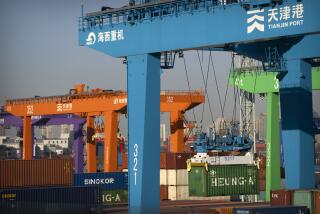IMF Chief Warns of ‘Devastating Trends’ in World Economy
WASHINGTON — IMF Managing Director Michel Camdessus warned Thursday of the risk of “devastating trends” hitting the world economy and appealed for a global growth strategy to combat them.
Setting the stage for a series of international financial meetings that start today, Camdessus painted a bleak picture of a world economy beset by high and rising unemployment, anemic growth and mounting protectionism.
“There are important problems,” the International Monetary Fund chief told reporters. “Indeed, several of them could become devastating trends if they are not reversed.”
He said the answer is a global growth strategy that puts trade liberalization at the top of the agenda and that includes interest rate cuts and reduced budget deficits in the industrial world.
The IMF has forecast that industrial countries will experience only meager growth of 1.1% this year and 2.2% next year.
Economic policy-makers from more than 175 nations are gathering here for an IMF/World Bank annual meeting that is expected to be dominated by two problems that refuse to go away: a sagging world economy and a Russian nation beset by political and economic turmoil.
Camdessus said he sees no reason to be pessimistic about the outlook for Russia, despite the political upheaval there. But he made clear that the IMF will not be lending Moscow any more money until the country puts its economic reforms back on track.
Acting to break the political deadlock gripping the country, Russian President Boris N. Yeltsin this week disbanded Parliament and called elections for December.
“The situation is very fluid, very difficult to analyze,” Camdessus said. “But our strategy here is not determined by the . . . political events.”
That strategy calls for Russia to put its economic house in order by clamping down on credit growth, slashing its huge government budget deficit and opening up its economy.
Camdessus said the United States and other rich nations may want to accelerate their help for Russia to aid Yeltsin, but he stressed that IMF loans will be tied to Moscow’s progress in reforming its economy.
The IMF chief appealed to the industrial nations to come up with a global growth strategy to put the world economy back on track after four years of sub-par growth.
At the top of that strategy should be an early conclusion of the Uruguay round of international trade talks. Those talks, aimed at liberalizing trade worldwide, have dragged on for seven years.
On Wednesday, the IMF painted a stark picture of the dangers facing the world economy. It said an expected upturn could still be delayed and warned of the risks of rising protectionism and joblessness.
“1993 marks the fourth consecutive year of sub-par growth performance for the world economy,” the IMF reported in its semi-annual economic outlook. “Indications of a resumption of stronger growth in 1994 are still tentative.”
The IMF said it is cautiously optimistic that global growth will pick up next year and is forecasting the world economy will expand by 3.2% in 1994, after rising by 2.2% in 1993.
But even with that stronger growth, unemployment may increase further through much of 1994, especially in Europe, fueling protectionism and xenophobia and threatening to delay efforts to cut bloated government budget deficits, it said.
Declaring that unemployment has risen to “intolerable levels,” the IMF said joblessness in the industrial world is expected to surpass 32 million people this year--equivalent to the populations of Spain and Sweden combined.
“Chronic unemployment is disrupting the social fabric in many countries, regions and communities,” it said. “The recent . . . increase in unemployment has also coincided with a rise in xenophobia and protectionist sentiment.”
Many in the industrial world have blamed increasingly competitive developing countries for rising joblessness and have advocated protectionist measures to combat it.
But the IMF said rather than shutting out imports from the developing world, industrial nations should increase the flexibility and efficiency of their workers and free up funds for the private sector by cutting budget deficits.
More to Read
Sign up for Essential California
The most important California stories and recommendations in your inbox every morning.
You may occasionally receive promotional content from the Los Angeles Times.










